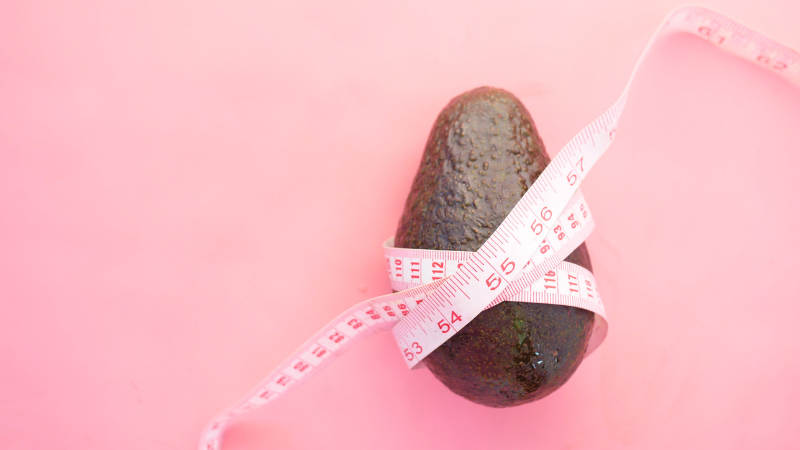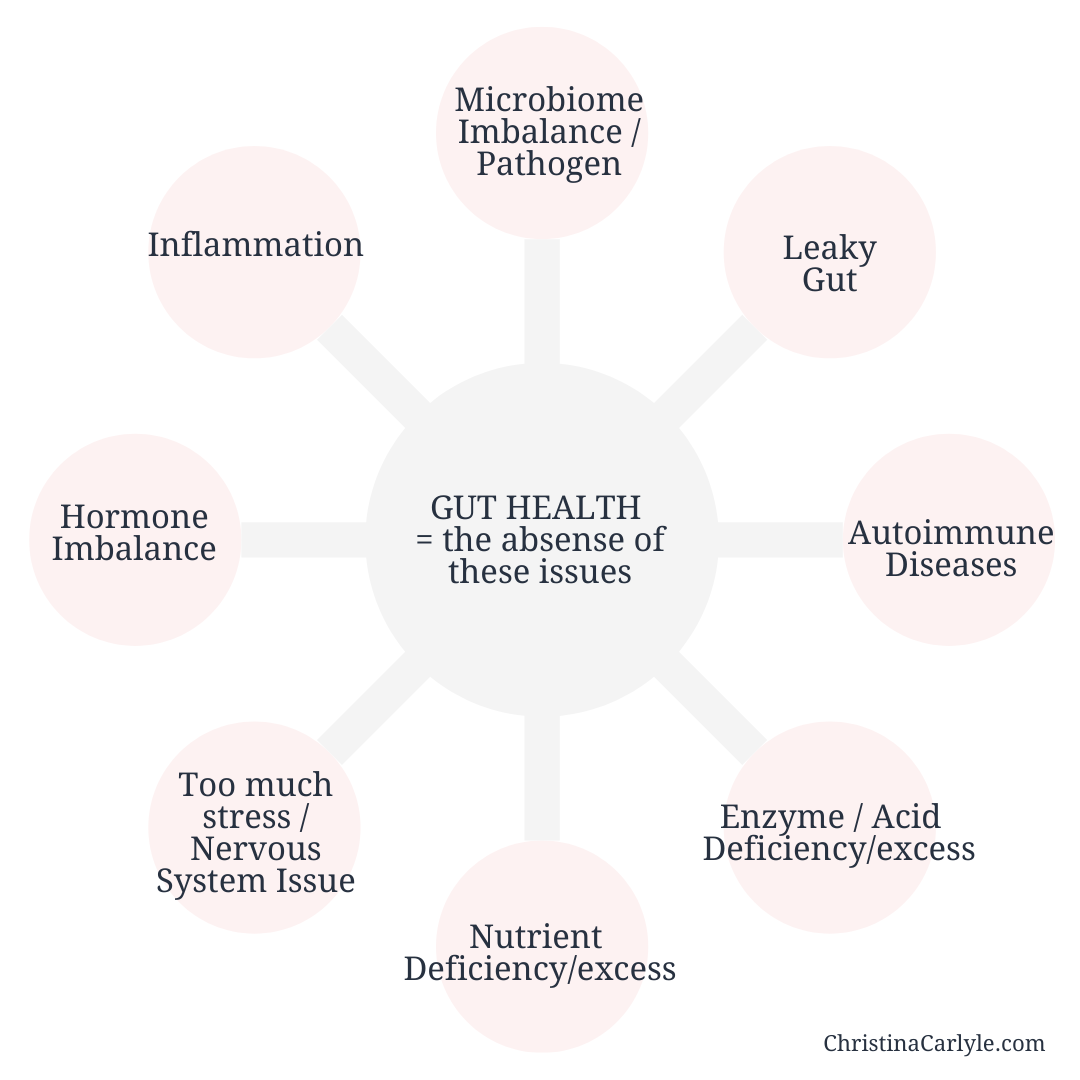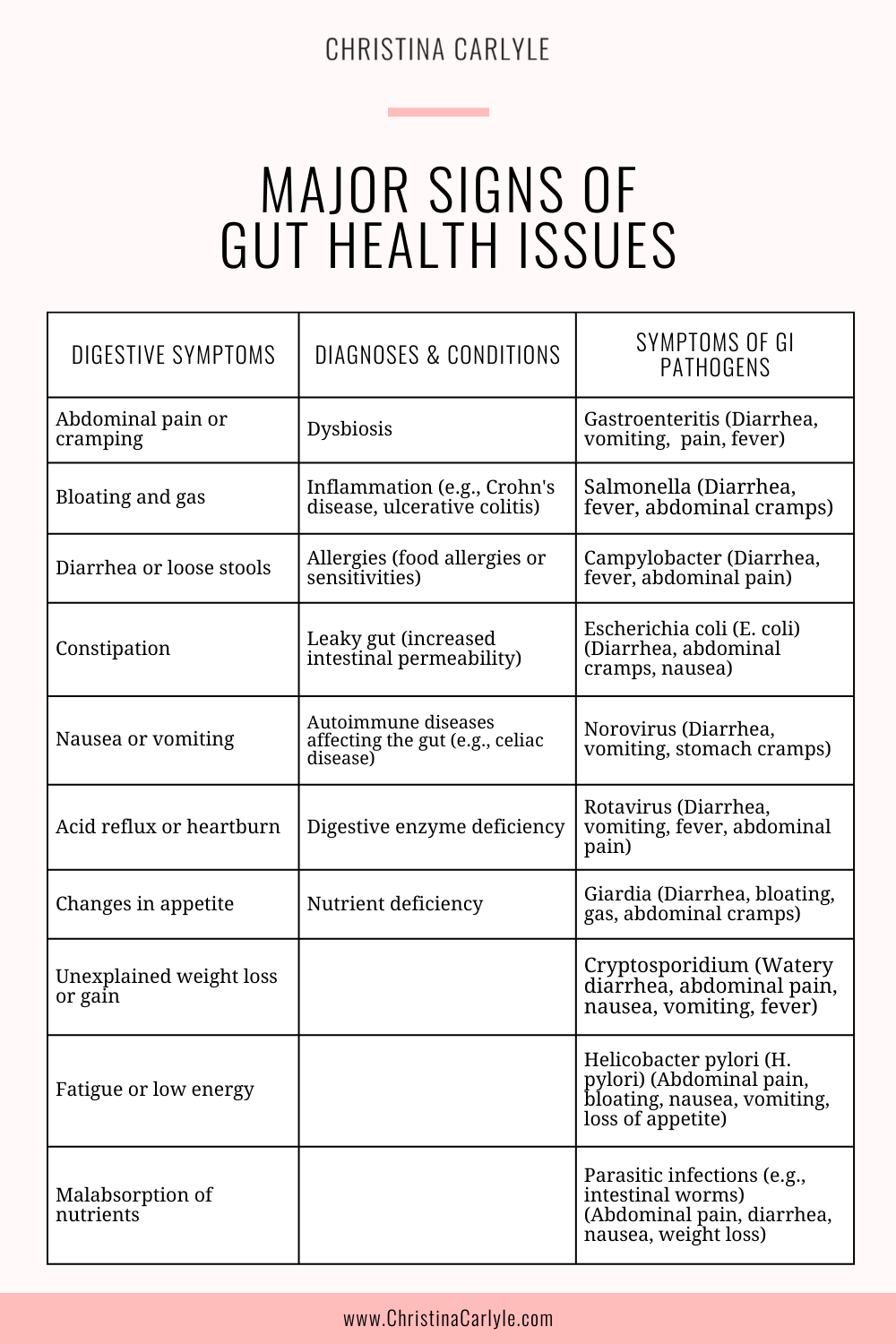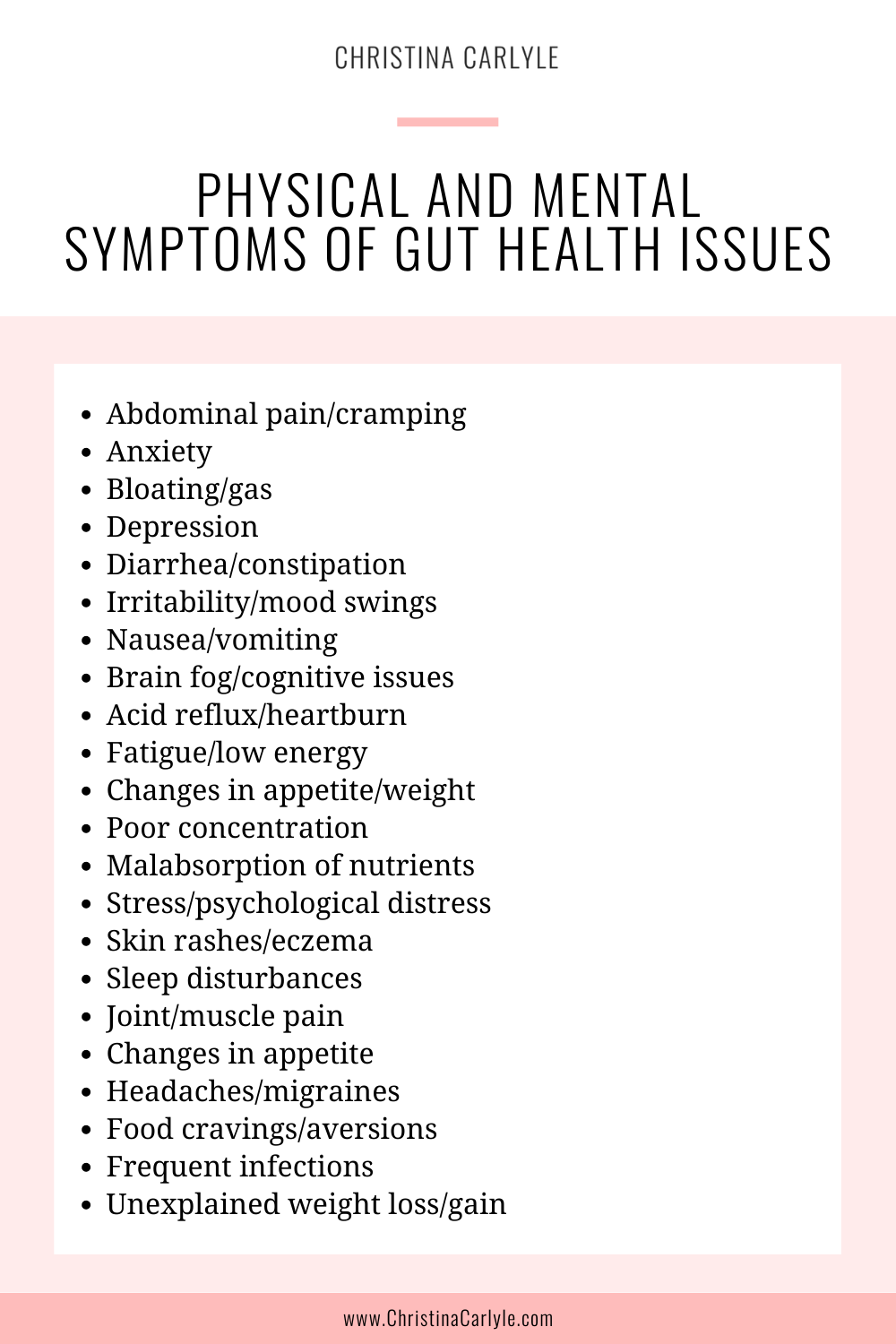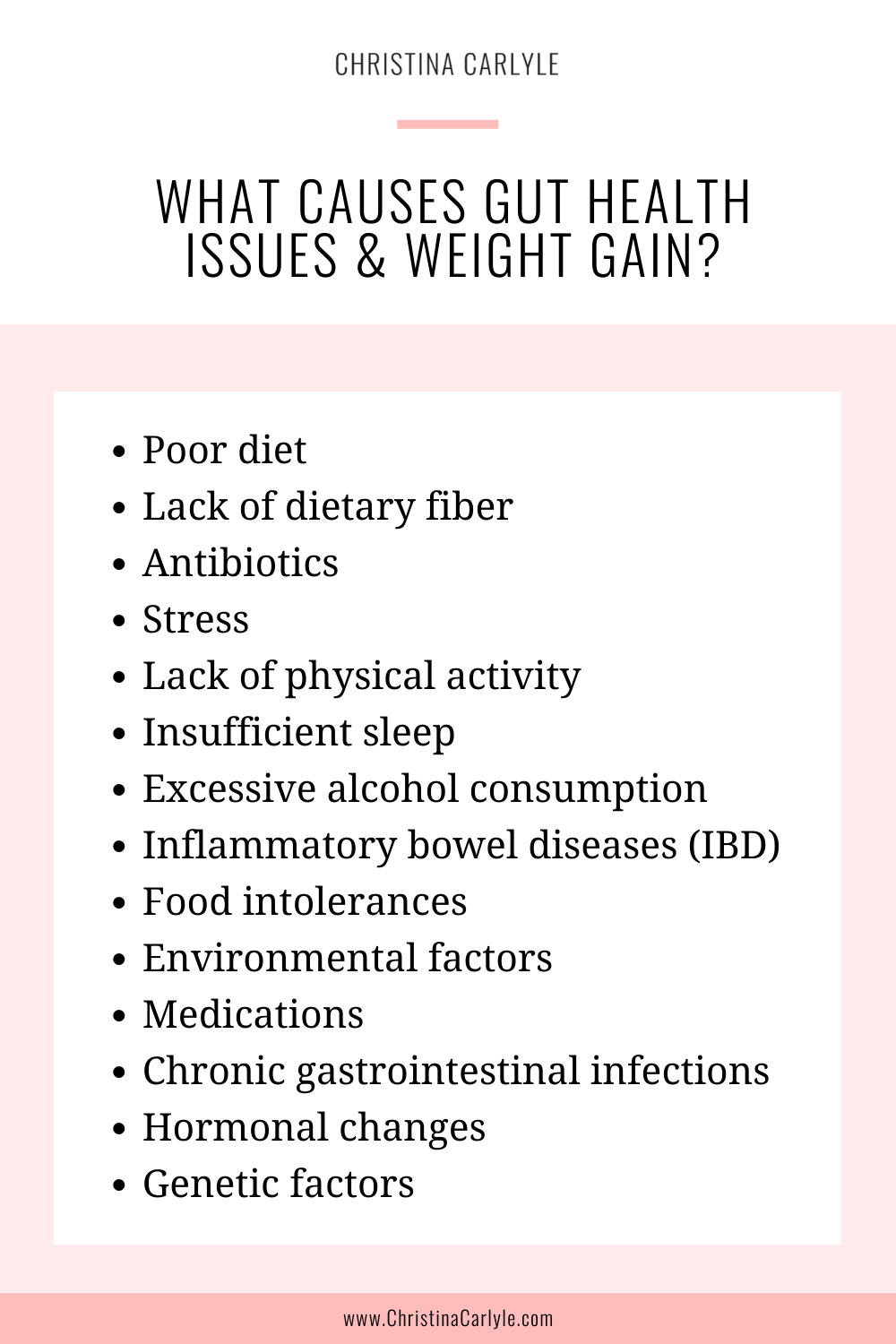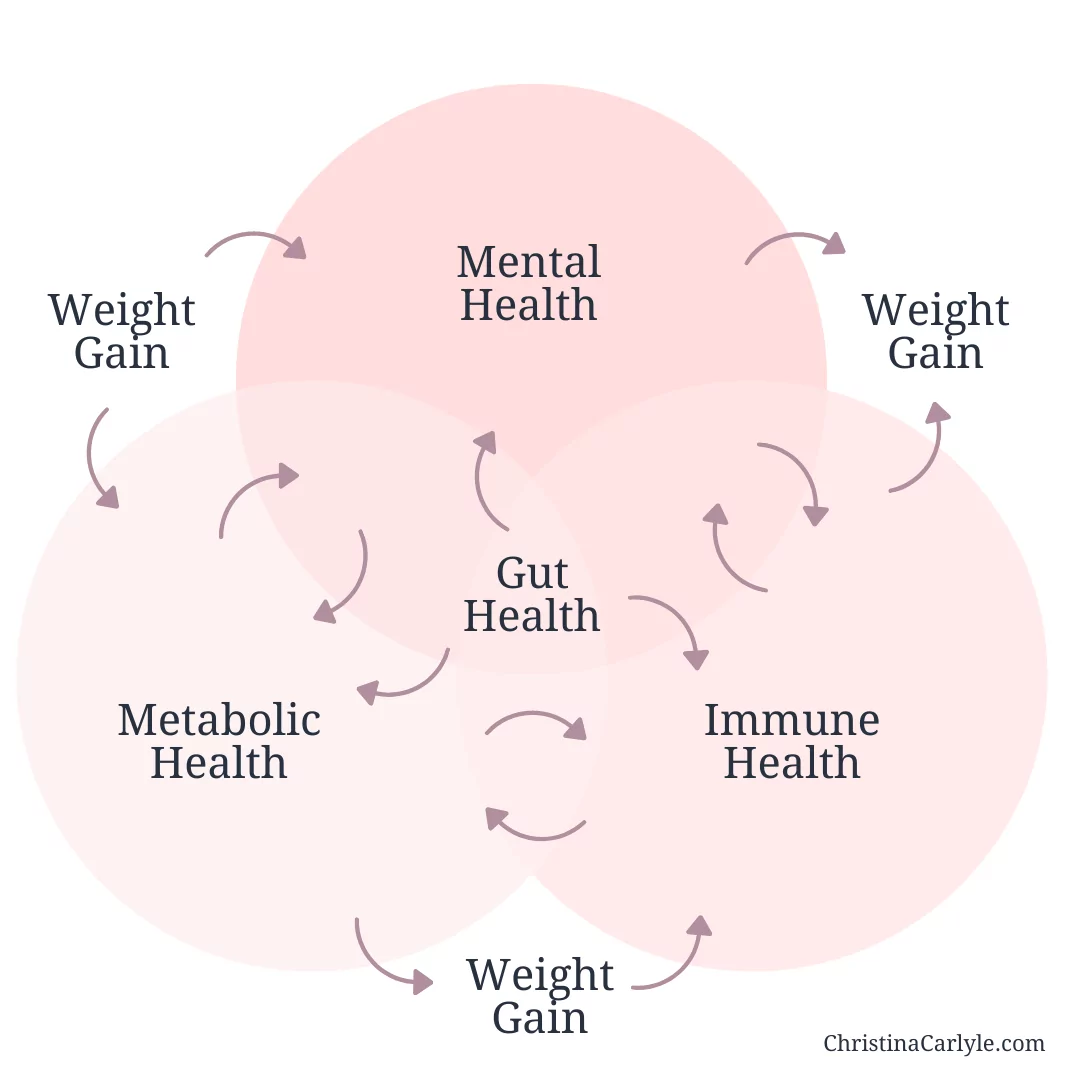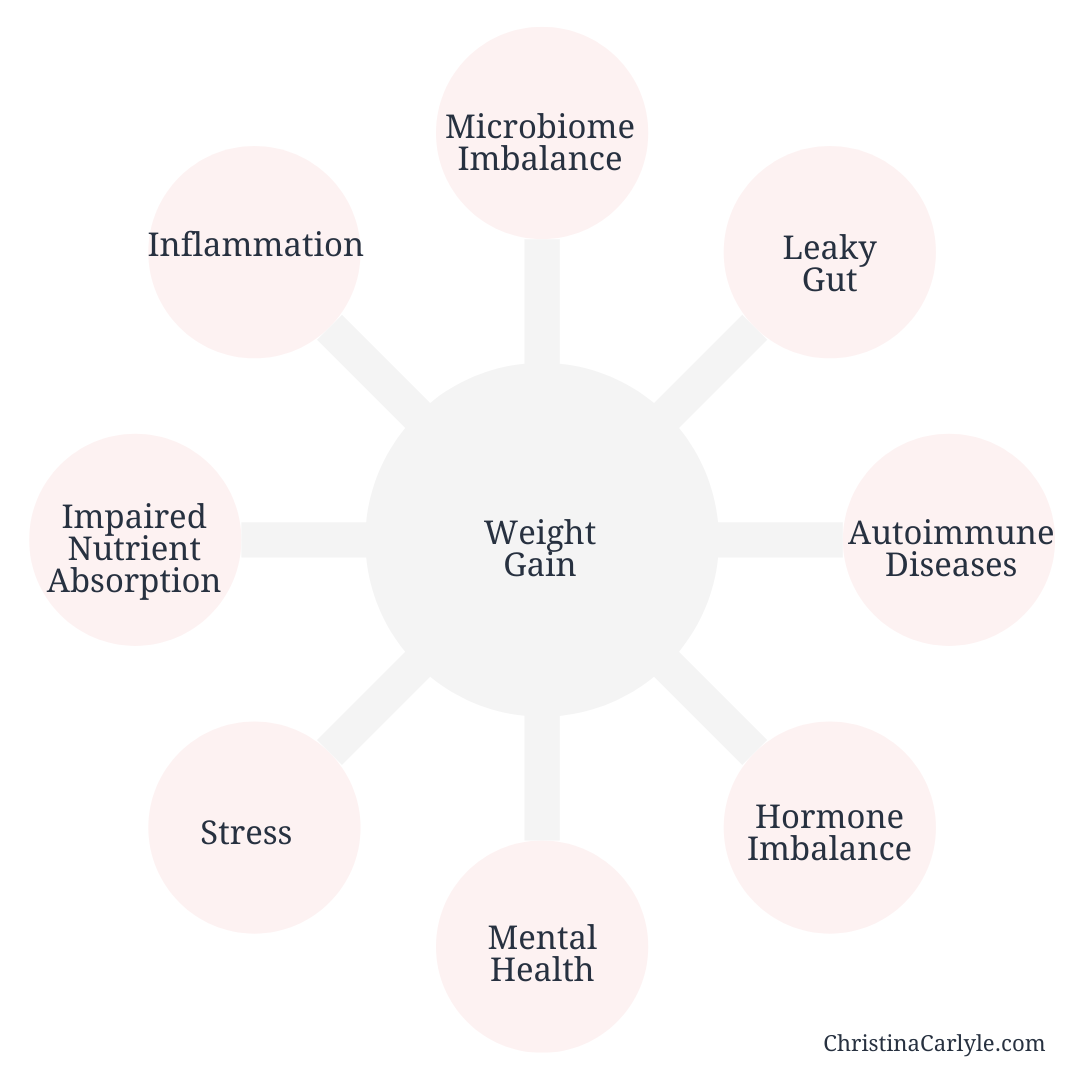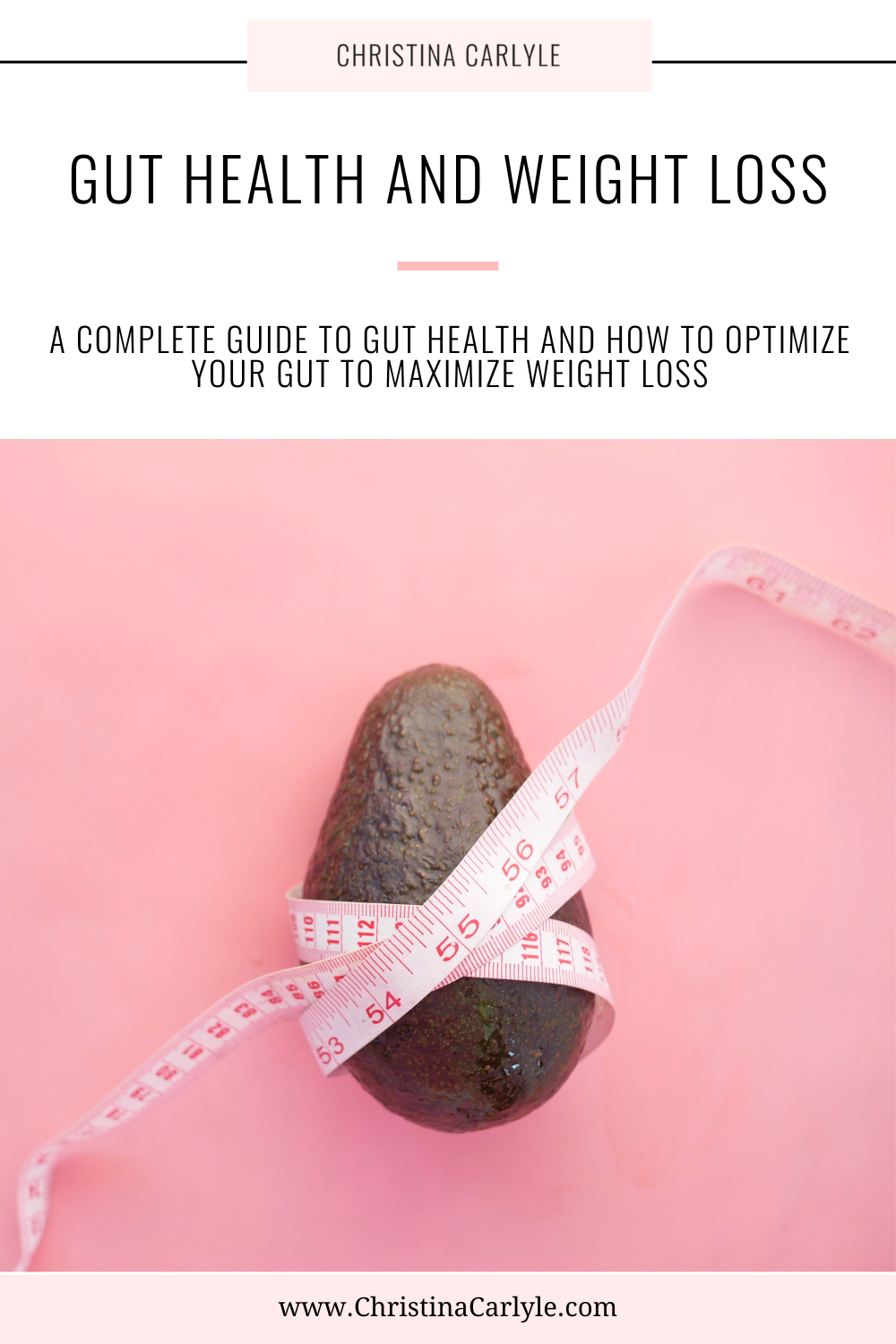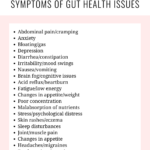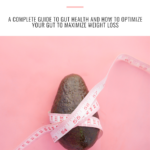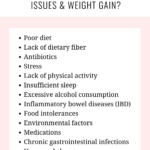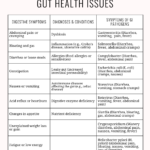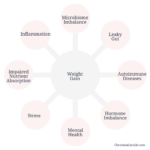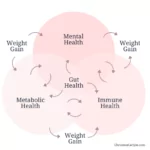Last Updated on June 14, 2023
Is there a link between gut health and weight loss? In the holistic nutrition world, it’s well-known that there’s a link between gut health, weight, metabolism, immunity, and mood.
When it comes to weight loss, the gut plays a crucial role in metabolic and immune function. Why? Because that’s where the food goes… and the gut literally makes or breaks your ability to lose weight, stay healthy, and feel good.
And if you’re consuming the wrong foods and drinks for gut health you can easily start to increase gut issues, health issues, mood & energy swings, and stubborn fat among other nasty symptoms.
Gut health and physical (immune) health go hand in hand and that health issues can cause weight gain and vice versa.
But it isn’t well known how gut health affects weight, metabolism, immunity, and mental health issues that can compound quickly, leading to more weight gain & symptoms that make it harder to lose weight.
When most people think about “gut health” they think of “leaky gut” or think the need to take probiotics. But there are several factors that contribute to ‘gut health’ that need to be in check if you want metabolism, immunity, and mood to function properly.
That’s why I’m kickstarting a gut health and weight loss series to further explain the gut in detail and how necessary it is for health and weight loss. I’ll also be answering commonly asked questions like ‘What are probiotics?’ “What’s leaky gut?” and “How do I heal my gut?” along the way.
Let’s get started!
Weight and Gut Health
The genes within our gut bacteria alone outnumber our human genes by 250 to 800 times, and the substances produced by these bacterial genes can enter our bloodstream, affecting our body chemistry.
The metabolism is literally defined as the sum of all chemical reactions happening in the body.
When you consume things that negatively alter these genes you’ll experience metabolism, immune, and mood disorders… i.e. a slow metabolism and a bunch of symptoms that make it harder to lose weight.
But as with ‘leaky gut,’ gut bacteria are a small piece of the ‘gut health puzzle.’
So first, we’re going to go over all of the major pieces that contribute to gut health. Then I’ll explain how issues with the gut can affect your ability to lose fat.
WHAT IS GUT HEALTH?
Gut health refers to the overall well-being and proper functioning of the gastrointestinal (GI) tract, which includes the stomach, intestines, and other digestive organs. The GI tract plays a crucial role in the digestion and absorption of nutrients, elimination of waste products, and the body’s immune system.
Gut health is usually defined as the absence of illnesses related to the gut and the bodily systems it affects.
Gut health is a multi-faceted topic. There are many ‘facets’ that contribute to the generalized term ‘gut health.’ If any of these issues are present, gut health will become compromised and symptoms will be present. Left untreated, they compound rapidly racking up problems and stubborn fat along the way.
Things that Negatively Impact Gut Health (and weight)
- Imbalanced Microbiome: There are trillions of bacteria, microbes, yeast, fungus, and viruses in the gut. In fact, the quantity of gut microbes far outnumbers the cells in the body. A diverse and balanced population of beneficial bacteria in the gut is essential for optimal gut health. An imbalance, known as dysbiosis, occurs when healthy microbes die off and harmful bacteria outnumber the beneficial ones, leading to gut dysbiosis & pathogenic infections. Lifestyle choices and habits can create dysbiosis and pathogens, and you can ‘catch’ a pathogen. For example, getting a parasite from sushi, E Coli from unwashed produce, or food poisoning. Dysbiosis & pathogens can cause digestive issues, mood issues, cravings, fatigue, inflammation, and other health problems that can easily contribute to weight gain. You need a balanced microbiome to be healthy, happy, and fit. It’s impossible to heal the gut without balancing it first because an imbalance and/or pathogens can quickly cause the next issue…
- Inflammation: Chronic inflammation in the gut can disrupt the delicate balance of the digestive system and impair gut function. It can be caused by factors such as a poor diet, stress, infections, or certain medications. Managing inflammation is crucial for maintaining gut health. Typically an imbalanced microbiome can cause inflammation but so can an inflammatory diet. So a bad diet can cause dysbiosis and inflammation… but inflammation can cause dysbiosis and dysbiosis can cause inflammation. When dysbiosis and inflammation are present at the same time they can cause more gut issues like…
- Leaky Gut: Increased intestinal permeability, commonly known as leaky gut, occurs when the lining of the intestines becomes compromised (so inflamed and damaged) that microscopic toxins and undigested food particles can begin to leak into the bloodstream. This can trigger an immune response, leading to inflammation and various health issues. Pathogens can also escape into the body and start colonizing in your organs. This is when inflammation can go system-wide and symptoms and other gut issues start to manifest… which is the fast track to a diagnosis (hormone, inflammatory, and/or metabolic diseases are commonly diagnosed after leaky gut goes untreated for too long.) The is another common diagnosis…
- Allergies: Food allergies, intolerances, and sensitivities can all significantly impact gut health. Allergens in certain foods can trigger an immune response, causing inflammation and gastrointestinal symptoms, such as bloating, diarrhea, or abdominal pain. Some individuals may experience personal food sensitivities, where certain foods may trigger symptoms or discomfort even without a diagnosed allergy. These sensitivities can contribute to inflammation, gut permeability, and microbiome imbalances, affecting gut health in other ways. A food sensitivity, intolerance, and allergy have different biomarkers and diagnostic tests to confirm that they’re present. Generally speaking, if you have any allergies, intolerances, or sensitivity to ANYTHING you most likely have a leaky gut. That’s because microscopic food particles are floating around the bloodstream and your body starts to reject them. This includes seasonal allergies, too. Impaired gut health can make your reaction to non-consumable allergens, like pollen or dander, worse, too. Allergenic reasons are stressful & inflammatory to the body… leading to more leaky gut, dysbiosis, nutrient deficiency, and GI issues.
- Autoimmune Disorders: Autoimmune disorders, such as celiac disease, Crohn’s disease, or ulcerative colitis, can affect the gut and disrupt its normal functioning. In these conditions, the immune system mistakenly attacks the digestive system, leading to inflammation and damage to the gut lining. An autoimmune reaction is different than an allergy. Autoimmune issues & allergies have a different sets of diagnostic tests because they affect different biomarkers. So you can test positive for an allergic reaction to gluten but test negative for Celiac disease. And because diet affects gut genes… you can literally eat yourself into a diagnosis by changing your gene expression.
- Digestive Deficiency (or excess): Sufficient production of digestive enzymes and stomach acids are essential for breaking down food and facilitating nutrient absorption. Inflammation and dysbiosis can block nutrient absorption. But you can be genetically disposed to have too much/little enzymes or low stomach acid that hinders digestion and nutrient absorption. But you can also eat/drink yourself into deficiencies/excess or digestive juices, too. For example, short-chained fatty acid production is critical to gut health.
- Dietary Deficiency (or excess): You have to consume specific nutrients to maintain gut health. Specifically, short-chain fatty acids (SCFAs) which are organic compounds produced by beneficial gut bacteria during the fermentation of dietary fiber. They play a vital role in gut health by serving as an energy source for intestinal cells, promoting gut motility, reducing inflammation, enhancing nutrient absorption, regulating immune function, and supporting a diverse gut microbiota. SCFAs, particularly butyrate, contribute to the integrity of the intestinal barrier, prevent constipation, modulate the immune response, and maintain a balanced gut environment. So a dietary deficiency of short-chained fatty acids can contribute to gut health issues… but that’s just one nutrient and there are DOZENS of different nutrients you need to get in a balanced way… A diet high in processed foods, sugar, and refined carbohydrates, that’s lacking the fibers and nutrients mandatory for gut health can contribute to inflammation and disrupt the integrity of the intestinal lining, trigger autoimmune reactions, a microbiome imbalance, allergen/sensitivities, and other pesky digestive issues like gas and bloating as it reacts to digestive acids and enzymes.
Gut health is defined as the absence of these issues. If you have these symptoms gut health needs to be a priority.
The more of these issues you have, the worse your metabolism, immunity, mood, and weight will become. As issues escalate your symptoms will, too.
Gut health needs to become a priority. Because as the gut is left untreated, the metabolism will slow and weight becomes more stubborn.
If you’re having a hard time losing weight & struggling with gut symptoms you most likely also have metabolic dysfunction. This free training explains more about metabolic dysfunction & how I fix it so you can lose weight & feel great ASAP.
GUT HEALTH SYMPTOMS
Creating an exhaustive list of every possible symptom that can occur with a gut health issue would be extremely challenging, as symptoms can vary greatly depending on the specific condition and individual factors like genetics and metabolic type.
Here’s a general overview of symptoms commonly associated with gut health issues:
| Physical Symptoms | Mental/Emotional Symptoms |
|---|---|
| Abdominal pain/cramping | Anxiety |
| Bloating/gas | Depression |
| Diarrhea/constipation | Irritability/mood swings |
| Nausea/vomiting | Brain fog/cognitive issues |
| Acid reflux/heartburn | Fatigue/low energy |
| Changes in appetite/weight | Poor concentration |
| Malabsorption of nutrients | Stress/psychological distress |
| Skin rashes/eczema | Sleep disturbances |
| Joint/muscle pain | Changes in appetite |
| Headaches/migraines | Food cravings/aversions |
| Frequent infections | – |
| Unexplained weight loss/gain | – |
This isn’t an exhaustive list, and the presence and severity of symptoms can vary depending on the underlying gut health issue and individual factors.
I find that the more gut issues a person has, the more physical and mental health symptoms they’ll experience.
How many of these symptoms do you have?
WHAT CAUSES GUT HEALTH ISSUES AND WEIGHT GAIN
Here is a list of factors that can contribute to gut health and in turn affect metabolism, immunity, and/or weight:
- Poor diet: Consuming a diet high in processed foods, added sugars, unhealthy fats, and low in fiber can disrupt the balance of gut bacteria and contribute to digestive problems.
- Lack of dietary fiber: Insufficient intake of dietary fiber can lead to constipation, hinder proper digestion, and negatively impact the gut microbiota.
- Antibiotics: While antibiotics are important for treating bacterial infections, they can also disrupt the balance of beneficial bacteria in the gut, potentially leading to gut health issues.
- Stress: Chronic stress can impact gut health through changes in gut motility, increased gut sensitivity, and alterations in gut microbiota.
- Lack of physical activity: Sedentary lifestyles and a lack of regular exercise can contribute to sluggish digestion and poor gut health.
- Insufficient sleep: Inadequate sleep or poor sleep quality can affect gut health by influencing gut motility, immune function, and the gut-brain axis.
- Alcohol consumption: Excessive alcohol consumption can irritate the gastrointestinal lining, disrupt the gut microbiota, and lead to inflammation in the gut.
- Inflammatory bowel diseases (IBD): Conditions such as Crohn’s disease and ulcerative colitis cause chronic inflammation in the digestive tract, leading to gut health issues.
- Food intolerances: Certain individuals may experience gut health issues due to specific food intolerances or sensitivities, such as lactose intolerance or gluten sensitivity.
- Environmental factors: Exposure to environmental toxins, pollutants, and contaminants can have adverse effects on gut health and disrupt the gut microbiota.
- Medications: Some medications, such as nonsteroidal anti-inflammatory drugs (NSAIDs), proton pump inhibitors (PPIs), and certain antibiotics, can disrupt the gut microbiota or affect the integrity of the gut lining.
- Chronic gastrointestinal infections: Persistent infections caused by bacteria, viruses, or parasites can damage the gut lining and result in ongoing gut health issues.
- Hormonal changes: Hormonal fluctuations, particularly in women, can influence gut health and contribute to symptoms such as bloating, constipation, or diarrhea.
- Genetic factors: Certain genetic conditions or predispositions can make individuals more susceptible to gut health issues, such as irritable bowel syndrome (IBS) or celiac disease.
I find that most people have no idea how their health issues and habits are affecting their gut health. And those that are aware of gut health are trying but aren’t really addressing the root cause.
For example, I’ve had clients say oh, I’m not allergic to dairy, but don’t realize they have a pathogenic microbiome imbalance that can’t be healed while consuming dairy… and that the dairy they’re constantly craving is also causing inflammation, hormone imbalances, resistant pathogens/infections, cravings, more symptoms & weight gain. So even though they’re not allergic to dairy their gut health is still being affected.
Other clients have said they’ve tested negative for Celiac disease and have ‘no problems’ with bread. But when I ask if they’ve had an allergy, sensitivity, GI map, hormone or inflammatory marker tests they say no.
Testing negative for one thing doesn’t mean you’re automatically negative for other tests. A lot of GI tests aren’t accurate either… It’s very common to be told you’re normal even though you feel like shit and your labs are fine. Inconclusive results are very common when testing for enzymes, inflammation, hormones, other metabolic markers, and parasites.
An allergy, a sensitivity, and a disease all have different biomarkers that require different tests. So do different nutrients, gut functions, pathogens, hormones, and inflammation. Most of the accurate tests aren’t covered by insurance.
You can also test negative for a disease but can be triggering inflammation, leaky gut, and other issues that can eventually alter genes and cause disease.
Generally speaking, the more gut issues you experience, the more metabolic issues & symptoms you’ll have.
The more issues you have, the slower the metabolism will become. The slower your metabolism gets, the more weight you’ll gain. And as physical and mental symptoms increase, weight generally does, too.
Unresolved gut health issues left untreated contribute to weight gain.
They can also contribute to metabolic and immune functions that further contribute to weight gain and physical/mental symptoms that make it difficult to lose weight.
But let’s say you’re stressed and are the kind of person that doesn’t eat when they’re stressed…
Stress can imbalance the gut, cause gut inflammation, leaky gut and cravings for processed foods. So yes, you can lose weight while you have Gut issues. But then more weight you lose the more nutrient deficient you’ll become. Nutrient deficiencies stress the body and prevent healing which can in turn cause more gut health issues & a slower metabolism.
This is a reason why crash diets are so harmful and actually cause weight gain…
they damage the gut and slow the metabolism in the first place which only sets you up for rapid regain.
How Gut Health Issues Cause Weight Gain
Gut health issues, such as a gut microbiome imbalance, inflammation, leaky gut, and autoimmune diseases, can have various impacts on metabolism and contribute to weight gain.
Here are some of the ways these issues can affect your ability to lose weight:
- Gut Microbiome Imbalance: The gut microbiome consists of trillions of bacteria that play a crucial role in digestion, nutrient absorption, and metabolism. An imbalance in the gut microbiome, where harmful bacteria outweigh the beneficial ones, can lead to inefficient digestion and impaired metabolism. This imbalance may result in decreased energy expenditure and increased storage of fat and inflammatory water retention & digestive issues that can contribute to weight gain.
- Inflammation: Chronic inflammation in the gut disrupts normal metabolic processes and impairs insulin sensitivity. This affects how the body utilizes glucose and stores fat. Inflammation can also lead to the release of certain hormones and cytokines that promote fat accumulation and inhibit fat breakdown, further contributing to weight gain. In addition to inflammation & weight gain caused by poor diet, stress, and lifestyle choices, a microbiome imbalance can contribute to inflammation and weight gain, too.
- Leaky Gut: Increased intestinal permeability, or leaky gut, allows toxins, undigested food particles, and bacteria to leak from the gut into the bloodstream. This triggers an immune response, leading to systemic inflammation. Chronic inflammation can disrupt metabolism and contribute to insulin resistance, leading to weight gain and difficulty losing weight. Leaky gut typically increases inflammatory water weight & digestive issues so you’ll gain even more weight from extra water and toxic waste as leaky gut and inflammation escalate.
- Autoimmune Diseases: Autoimmune diseases affecting the gut, such as celiac disease or inflammatory bowel disease, can lead to chronic inflammation and damage to the gut lining. This impairs nutrient absorption and disrupts normal metabolic processes. Additionally, autoimmune diseases often involve immune dysregulation, which can further impact metabolism and contribute to weight gain. The maximum amount of weight that an autoimmune disorder can cause is approximately 15 pounds maximum. Once symptoms, inflammatory water and waste weight are reduced & nutrients can be absorbed properly it can become easier to lose weight.
- Impaired Nutrient Absorption: Gut health issues can impair the absorption of essential nutrients, including vitamins, minerals, and fatty acids. Nutrient deficiencies can disrupt metabolic processes, leading to decreased energy production, slowed metabolism, and weight gain. If your gut can’t absorb nutrients, or if you’re not getting enough nutrients as it is, your metabolism will slow and your weight will increase.
- Hormonal Imbalances: The gut microbiome influences the production and regulation of various hormones that play a role in metabolism and weight regulation. Imbalances in gut bacteria can lead to dysregulation of hormones such as insulin, leptin, and ghrelin, which can impact appetite, energy balance, and fat storage. Pathogens in the gut microbiome can also manipulate hormones and cause cravings for the inflammatory foods/drinks that fuel them.
- Stress and Mental Health Issues: Mental health issues and chronic stress can impact gut health and contribute to weight gain. The gut-brain axis, the bidirectional communication between the gut and the brain, can be disrupted by mental health conditions, leading to changes in gut function and microbiota. Chronic stress releases hormones that can affect gut permeability and trigger inflammation. Imbalances in the gut microbiota, caused by mental health issues and stress, can lead to digestive problems. Moreover, altered eating patterns, including emotional eating and unhealthy food choices, can contribute to weight gain. Hormonal regulation related to appetite and metabolism can also be affected during stress/emotional eating, and can cause you to always feel hungry and never feel full. This is how emotional eating can cause weight gain and gut health issues.
So even if you eat perfectly for gut health… you can be too stressed/emotional and cause all types of gut health issues.
Gut health and the issues of impaired gut health cause can all contribute to weight gain and make it harder to lose weight.
As you can see, healing the gut is necessary to optimize metabolism and immunity so you can lose weight, get healthy, and feel happy, energized, and in control of food.
Because if you don’t you’ll experience a whole host of pesky health issues. Most of which have a direct impact on weight, energy, and mood that make it even harder to lose weight.
Here are the most common ways gut health can contribute to weight gain.
- Cravings: The gut microbiota can influence our food choices and cravings. Certain bacteria in the gut thrive on specific types of food, such as sugar and processed carbohydrates. When these bacteria are overabundant or imbalanced, they can send signals to the brain that trigger cravings for those particular foods. This can lead to a cycle of unhealthy eating habits, weight gain, and further disruption of gut health.
- Fatigue: Poor gut health can impair the absorption of nutrients essential for energy production, such as B vitamins and iron. Additionally, an imbalanced gut microbiota can produce metabolic byproducts that contribute to systemic inflammation. Chronic inflammation can lead to fatigue and reduced energy levels. A very common sign of gut health issues is having energy swings. If you feel tired, then wired. So if you’re tired all day and wide awake at night gut health should be prioritized… because sleep is necessary to heal the gut.
- Mood swings: The gut and the brain are closely interconnected through the gut-brain axis, which involves various communication pathways. The gut microbiota produces neurotransmitters, such as serotonin and dopamine, which are essential for regulating mood. Disruptions in the gut microbiota can impact the production and balance of these neurotransmitters, leading to mood swings, anxiety, and depression.
- Weight impact: Gut health issues can affect weight in multiple ways. An imbalanced gut microbiota may influence the metabolism of carbohydrates and fats, potentially leading to weight gain or difficulty losing weight. Gut health issues have a direct impact on metabolism and can affect the body’s ability to absorb nutrients and eliminate waste, leading to nutrient deficiencies that slow the metabolism. Additionally, inflammation caused by gut health problems can interfere with metabolic processes and hormonal regulation, further contributing to water & waste weight, slow metabolism, and cravings.
Once weight is affected, most people fall into the trap of cravings and emotional eating. Staying stuck in this cycle further destroys the gut microbiome, accelerates nutrient deficiencies, and slows metabolism, leading to accelerated aging, health issues, and weight gain.
The longer you’re stuck in the cycle, the harder it becomes to get out because once gut microbes become pathogenic they can affect your thoughts, tastes, and cravings, literally programming you to only want foods that keep you stuck.
A root-cause approach to weight loss & wellness must include prioritizing healing the gut which includes balancing the gut microbiome.
How to Improve Gut Health for Weight Loss
This holistic approach helps reverse weight, inflammation, symptoms, and metabolic dysfunction that make it harder to stay on track & get results.
Plus, if you don’t heal the gut you won’t be able to absorb and metabolize nutrients properly which is mandatory for optimal metabolism, fat burning, and health (both physical & mental).
Hint: That’s what my Total Transformation Program does and why it works so well. It rapidly reverse all root causes of weight gain, including the gut, hormone imbalances, inflammation, and detox, to maximize metabolism, immunity, and mood… it can literally change the way you look and feel in 4 weeks flat.
A guided step-by-step approach is needed because understanding and knowing how to fix ‘the gut’ is a multi-faceted problem that requires a customized approach. If you just try to focus on fixing ‘one piece of the gut health problem’ without the other issues it’ll be difficult to get noticeable results or stay on track with your diet/workouts.
For instance, probiotics can help balance the gut, lose weight and get healthy, but probiotics only help address the gut microbiome – not hormone imbalances, inflammation, stress, nutrient absorption, or leaky gut… and if you take probiotics with leaky gut present they’ll leak into the body and can cause more sensitivities, inflammation, and histamine reactions.
So fixing the gut first requires understanding of all facets of gut health that matter… and a results-oriented strategy that’s been proven to work for everyone with a gut.
Enter my Guide to Gut Health for Wellness & Weight Loss Series.
This is the first installment in this series.
Use these steps as you go through my Gut Health Series designed to help you optimize gut health so you can maximize weight loss.
TIPS FOR GUT HEALTH & WEIGHT LOSS
Here’s a simple protocol to help boost gut health, reverse symptoms, maximize metabolism, and lose weight:
- Cut out bad-gut foods, drinks, supplements, and consumables & eat a diet that promotes gut health and healing. You can’t heal the gut simply by eating healthy… you have to avoid the wrong things and eat the right things to heal the gut and reverse inflammation, microbiome, hormone, toxicity, metabolic, and nutrient absorption issues. (That’s what my Total Transformation Program)
- Repopulate your gut with Probiotic supplements.
- Eat high Probiotic and Prebiotic foods with every meal. (at least one serving of both per meal.)
- Engage in a healthy lifestyle & other healthy habits that support gut health and metabolism (like stress management, hydration, exercise, supplementation, etc. – all of which are covered in my Total Transformation Program)
You have to have all steps in place to get benefits… if you’ve taken a probiotic before but didn’t feel a difference it’s because you were missing the other two critical steps!
\When you combine the right diet + healing protocols & supplements you’ll get results you can see and feel a LOT faster.
You can’t really fix a problem if your diet is causing issues in the first place. And supplements won’t do much if you’re fueling inflammation and pathogens with a bad diet.
If you really want to clean up your diet, heal your gut, reverse inflammation, balance hormones, and get rid of fatigue and cravings – AND lose weight – you need my Total Transformation Program.
Use my mini protocol + Gut Health and Weight Loss Guide + the pre and probiotics that I recommend along with my Total Transformation Program for the best results.

4 week before and afters on my Total Transformation Program
I hope this helped you!
Make sure you subscribe now so you don’t miss next week’s training.
Your Coach and Biggest Cheerleader,
![]()
MORE GUT HEALTH & WEIGHT LOSS INFO
Check out these related articles to fill in more of the “gut health puzzle” so you’ll understand more about the different aspects of gut health, how they cause symptoms & weight gain, and how to optimize your gut health to maximize your weight loss potential:
- Gut Health and Weight Loss
- What are Probiotics?
- Probiotics and Weight Loss
- What are Prebiotics?
- The Best Foods for Gut Health
- What is Leaky Gut?
- Gut Health Supplements
- Intestinal Inflammation
- Gut Microbiome
Remember, if you have gut health symptoms you most likely also have metabolic dysfunction. This free training explains more about metabolic dysfunction & how I fix it so you can lose weight & feel great ASAP.

